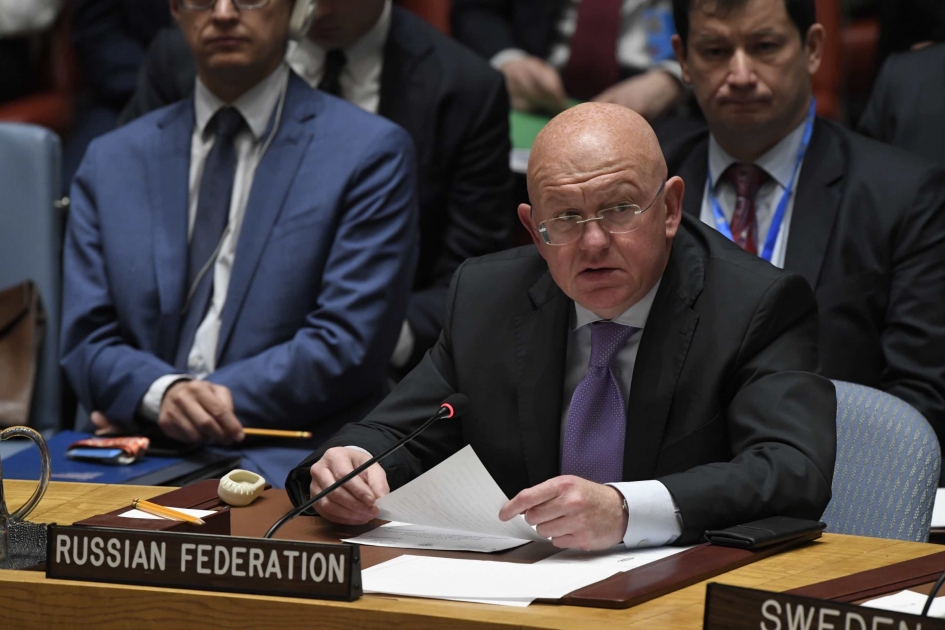Statement by Ambassador Vassily A. Nebenzia, Permanent Representative of the Russian Federation to the United Nations, at the Security Council meeting on the UN HRC report on the fact-finding mission in Myanmar
Today, before our very eyes, the Security Council forfeited consensus on yet another extremely important topic in the work of our Organization, resulting from an unconstructive, irresponsible tactic by a number of States designed to force us to hold a meeting to discuss the report of the independent international fact-finding mission on Myanmar established by the Human Rights Council (A/HRC/39/64). As we already noted in our statement on the reasons for the procedural vote, we see absolutely no added value in a briefing to the Security Council on the subject.
We have been made to discuss a very strange report, whose legitimacy has given rise to serious doubts. It has already been widely criticized within the Human Rights Council by many delegations, including ours, which testifies to its confrontational nature and which in itself devalues any discussion of the document that has been dumped on the Security Council. We are all aware that Myanmar is not cooperating with the fact-finding mission, and its representatives have never visited the country. It is therefore hardly possible to consider evidence collected outside the country concerned to be objective or exhaustive. That also fully applies to the so-called findings and conclusions based on that evidence.
Those who pushed for today’s discussion of the report in the Security Council are doing all they can to reduce the significance of the Myanmar authorities’ establishment on 30 July of an independent commission of inquiry, whose leaders and staff include reputable foreign representatives. Rather than blackmailing and intimidating Naypyidaw, it would be helpful to give the commission our whole-hearted multilateral support. After today’s meeting, no one should be left with any illusions about the fact that its instigators have absolutely no interest in resolving the problems of the Rohingya.
They are merely an excuse for putting shameless pressure on the authorities of a sovereign State and forcing it to do what its former colonizer and its allies want. The logical next step in that direction would be pressure for anti-Myanmar sanctions and corresponding Security Council resolutions, a course of action that we categorically refuse to support. I say that because it is hard to avoid noticing that Naypyidaw is trying to solve the refugee problem. Since the Security Council’s visit to Myanmar at the end of April and beginning of May, we have seen a number of positive changes.
The Myanmar leadership is working systematically to implement the recommendations of the Advisory Commission on Rakhine State with a view to achieving a comprehensive settlement of the crisis, and 81 of the 88 recommendations have been implemented so far. The authorities have repeatedly confirmed at the official level their willingness to ensure the gradual return of all the displaced, including from Bangladesh.
To date, Myanmar has verified the identity of more than 8,000 refugees. The steps taken to establish the infrastructure in Rakhine state needed for receiving and resettling returnees deserve high praise.Another positive example is the close cooperation of the Office of the United Nations High Commissioner for Refugees and the United Nations Development Programme with the Government of Myanmar on implementing the tripartite memorandum of understanding signed on 6 June.
We support the work of Christine Schraner Burgener, Special Envoy of the Secretary-General on Myanmar, who has already visited the country three times, most recently from 10 to 20 October, and we note the positive response of the Myanmar authorities to her proposal for opening an office in Naypyidaw. For our part, we have consistently supported a balanced and non-confrontational approach in discussing the situation in Myanmar and finding ways to normalize the humanitarian situation in Rakhine, including resolving the issue of the Rohingya.
We should keep in mind that the underlying problems in Rakhine are multifaceted and complex, and can be resolved only through peaceful political and diplomatic efforts establishing a dialogue between the authorities in Naypyidaw and Dhaka and representatives of all ethnic and religious groups. The agreed legal basis for negotiations between Myanmar and Bangladesh and the functioning coordination mechanisms will make it possible to take practical steps in that direction. The tactic of postponing the start of the repatriation process, which is increasingly being used by outside forces to put additional pressure on Myanmar, is counterproductive.
At this stage, we believe that the priority is ensuring international cooperation with a view to tackling the worst humanitarian consequences of the crisis. We believe it is essential to provide assistance to both Bangladesh and Myanmar, and that it is also the role of the international community to help Naypyidaw and Dhaka implement their existing agreements.
We see the Rakhine issue as part of a wider context of the broad challenges and tasks facing the democratically elected leadership in Myanmar. We do not support attempts to saddle Naypyidaw or specific groups in Myanmar with the entire responsibility for resolving the crisis, while ignoring the need to combat terrorist groups, above all the Arakan Rohingya Salvation Army, whose attacks launched by that group did a great deal to provoke the situation in Rakhine state.
Such actions only make the prospects for a solid inter-ethnic peace in Myanmar and for its effective cooperation with the international community more distant. We believe that assistance to the Governments of Myanmar and Bangladesh in resolving the situation related to Rakhine state should be provided in a spirit of equality and mutual respect. Unfortunately, today’s meeting contributes absolutely nothing to that.
